组织行为学精要第十版Chapter 2 Personality Traits and Work Values
- 格式:ppt
- 大小:1.39 MB
- 文档页数:32
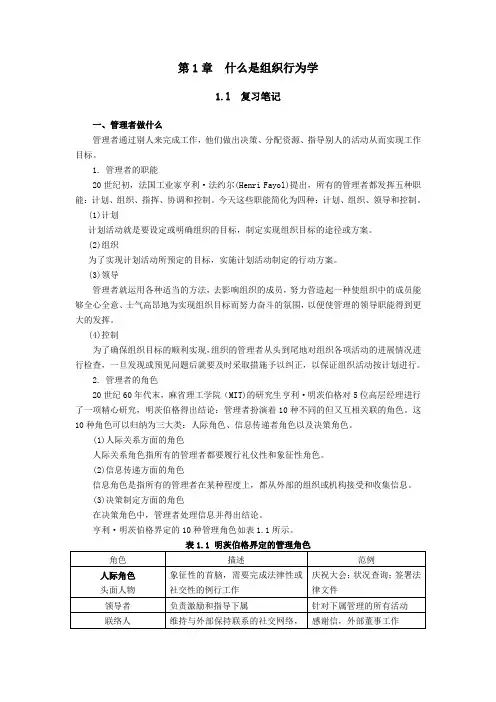
第1章什么是组织行为学1.l 复习笔记一、管理者做什么管理者通过别人来完成工作,他们做出决策、分配资源、指导别人的活动从而实现工作目标。
1. 管理者的职能20世纪初,法国工业家亨利·法约尔(Henri Fayol)提出,所有的管理者都发挥五种职能:计划、组织、指挥、协调和控制。
今天这些职能简化为四种:计划、组织、领导和控制。
(1)计划计划活动就是要设定或明确组织的目标,制定实现组织目标的途径或方案。
(2)组织为了实现计划活动所预定的目标,实施计划活动制定的行动方案。
(3)领导管理者就运用各种适当的方法,去影响组织的成员,努力营造起一种使组织中的成员能够全心全意、士气高昂地为实现组织目标而努力奋斗的氛围,以便使管理的领导职能得到更大的发挥。
(4)控制为了确保组织目标的顺利实现,组织的管理者从头到尾地对组织各项活动的进展情况进行检查,一旦发现或预见问题后就要及时采取措施予以纠正,以保证组织活动按计划进行。
2. 管理者的角色20世纪60年代末,麻省理工学院(MIT)的研究生亨利·明茨伯格对5位高层经理进行了一项精心研究,明茨伯格得出结论:管理者扮演着10种不同的但又互相关联的角色。
这10种角色可以归纳为三大类:人际角色、信息传递者角色以及决策角色。
(1)人际关系方面的角色人际关系角色指所有的管理者都要履行礼仪性和象征性角色。
(2)信息传递方面的角色信息角色是指所有的管理者在某种程度上,都从外部的组织或机构接受和收集信息。
(3)决策制定方面的角色在决策角色中,管理者处理信息并得出结论。
亨利·明茨伯格界定的10种管理角色如表1.1所示。
3. 管理者的技能罗伯特·卡茨(Robert Katz)提出了三种基本的管理技能:技术技能、人际技能和概念技能。
(1)技术技能技术技能,指为了完成或理解一个组织的特定工作所必需的技能,也就是业务方面的技能。
(2)人际技能人际技能,指与组织单位中上下左右的人打交道的能力。
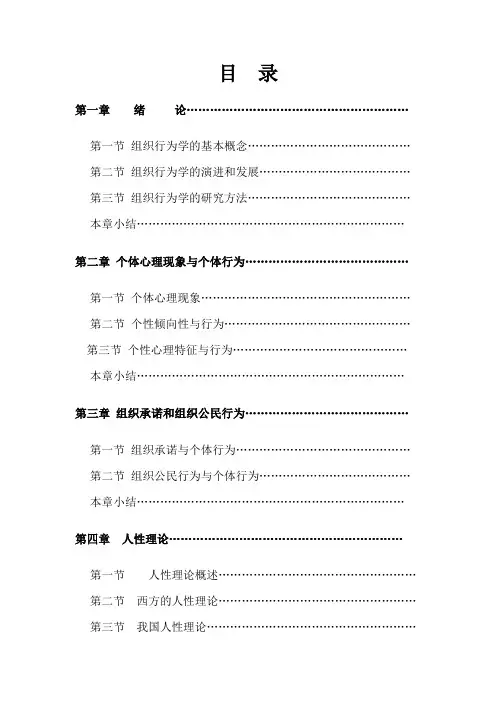
目录第一章绪论…………………………………………………第一节组织行为学的基本概念……………………………………第二节组织行为学的演进和发展…………………………………第三节组织行为学的研究方法……………………………………本章小结……………………………………………………………第二章个体心理现象与个体行为……………………………………第一节个体心理现象………………………………………………第二节个性倾向性与行为…………………………………………第三节个性心理特征与行为………………………………………本章小结……………………………………………………………第三章组织承诺和组织公民行为……………………………………第一节组织承诺与个体行为………………………………………第二节组织公民行为与个体行为…………………………………本章小结……………………………………………………………第四章人性理论……………………………………………………第一节人性理论概述……………………………………………第二节西方的人性理论……………………………………………第三节我国人性理论………………………………………………本章小结………………………………………………………………第五章群体心理、群体行为与群体绩效………………………………第一节群体概述……………………………………………………第二节非正式群体…………………………………………………第三节群体行为的一般规律……………………………………第四节影响群体心理、行为和绩效的主要因素…………………第五节群体决策……………………………………………………本章小结……………………………………………………………第六章组织中的人际关系…………………………………………第一节人际关系概述…………………………………………第二节人际关系的理论………………………………………第三节人际关系的平衡…………………………………………第四节人际关系的测量………………………………………本章小结…………………………………………………………第七章激励理论……………………………………………………第一节激励概述………………………………………第二节内容型激励理论……………………………………第三节过程型激励理论………………………………………第四节行为改造型激励理论…………………………………第五节激励理论与文化背景……………………………………本章小结…………………………………………………………第八章组织文化与组织行为……………………………………第一节组织文化的内涵………………………………………第二节组织文化的功能及影响因素…………………………第三节组织文化建设…………………………………………本章小结……………………………………………………………第九章领导的心理与组织行为……………………………………第一节领导及领导的影响力……………………………………第二节领导的有效性理论………………………………………第三节领导的有效性……………………………………………本章小结…………………………………………………………第十章组织行为的有效性…………………………………………第一节组织概述………………………………………………第二节组织结构………………………………………………第三节对组织变革的有效管理………………………………第四节组织发展………………………………………………本章小结…………………………………………………………参考文献。
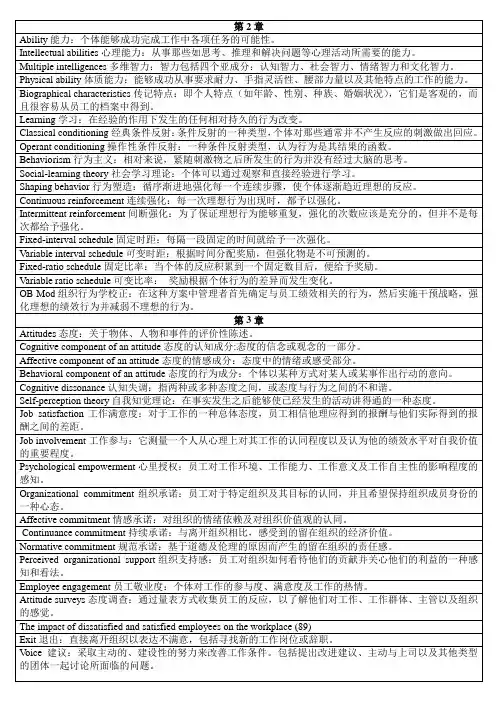
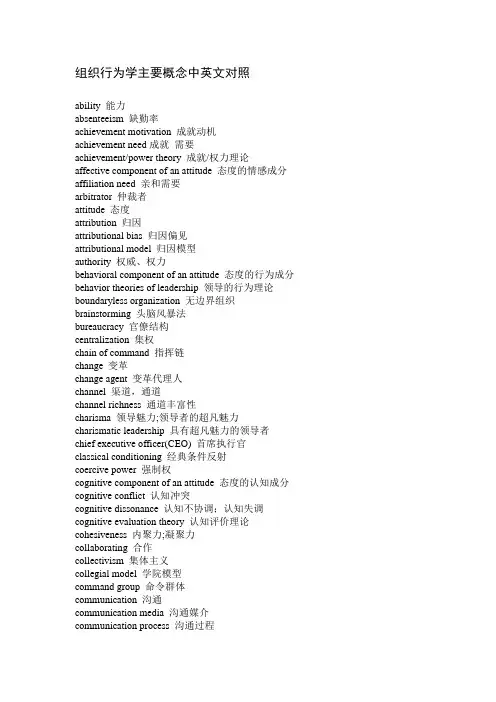
组织行为学主要概念中英文对照ability 能力absenteeism 缺勤率achievement motivation 成就动机achievement need成就需要achievement/power theory 成就/权力理论affective component of an attitude 态度的情感成分affiliation need 亲和需要arbitrator 仲裁者attitude 态度attribution 归因attributional bias 归因偏见attributional model 归因模型authority 权威、权力behavioral component of an attitude 态度的行为成分behavior theories of leadership 领导的行为理论boundaryless organization 无边界组织brainstorming 头脑风暴法bureaucracy 官僚结构centralization 集权chain of command 指挥链change 变革change agent 变革代理人channel 渠道,通道channel richness 通道丰富性charisma 领导魅力;领导者的超凡魅力charismatic leadership 具有超凡魅力的领导者chief executive officer(CEO) 首席执行官classical conditioning 经典条件反射coercive power 强制权cognitive component of an attitude 态度的认知成分cognitive conflict 认知冲突cognitive dissonance 认知不协调;认知失调cognitive evaluation theory 认知评价理论cohesiveness 内聚力;凝聚力collaborating 合作collectivism 集体主义collegial model 学院模型command group 命令群体communication 沟通communication media 沟通媒介communication process 沟通过程communication networks 沟通网络compromising 妥协conceptual skills 概念分析技能conciliator 调停者conflict 冲突conflict management 冲突管理conflict process 冲突过程conformity 从众content theories of motivation 内容型激励理论contingency model of leadership 领导的权变模型contrast effects 对比效应core dimensions of jobs 工作的核心纬度core values 核心价值观counseling 咨询cross—cultural communication 跨文化沟通cross—function teams 跨职能团队culture 文化decentralization 分权decisions 决策decoding 译码;解码delegation 授权Delphi technique 德尔菲法departmentalism 部门化dependent variables 因变量distributive bargaining 分配谈判distributive justice 分配公平downward communication 下行沟通dysfunctional conflict 功能失常性冲突employee stock ownership plans(ESOPs) 员工持股计划encoding 编码environment 环境equity theory 公平理论ERG theory ERG理论esteem needs 尊重需要existence needs 生存需要expectancy 期望expectancy theory 期望理论expert power 专家权力face—to-face communication 面对面的沟通Fiedler contingency model 费德勒权变模型formal group 正式群体formalization 正规化formalization stage 正规化阶段forming 形成functional conflict 功能正常性冲突fundamental attribution error 基本归因错误Gain sharing plan 收益分享计划goal setting 目标设置goal—setting theory 目标设置理论group 群体groupthink 群体思维growth need 成长需要halo effect 晕轮效应Hawthorne experiment 霍桑效应hierarchy of needs theory 需要层次理论higher-order needs 高层次需要horizontal conflict 横向冲突human relations 人际关系human skills 人际技能hygiene factors 保健因素illegitimate political behavior 非法的政治行为incentives 刺激;诱因independent variables 自变量individual differences 个体差异individualism 个人主义informal group 非正式群体informal leaders 非正式领导informal network 非正式网络informal organization 非正式组织information—based power 信息权information technology 信息技术instrumental values 工具性价值观integrative bargaining 整合谈判intergroup conflict 群体间冲突internal locus of control 内部控制点internals 内控者interorganizational conflict 组织间冲突interpersonal conflict 人际冲突intragroup conflict 群体内冲突intraorganizational conflict 组织内冲突intrapersonal conflict 个人内部冲突intuitive decision making 直觉决策lateral communication 横向沟通Leader-Member exchange(LMX) theory 领导-员工交换理论leader-participation model 领导参与模型leadership 领导leadership style 领导方式leading 领导learning 学习learning organization 学习型组织learning theory 学习理论Least-Preferred Co-worker(LPC)questionnaire 最难共事者问卷legitimate political behavior 合法的政治行为legitimate power 合法权利locus of control 控制点lower—order needs 低层次需要Maslow`s theory of needs 马斯洛需求理论Machiavellianism 马基雅维里主义maintenance factor 保健因素Management By Objectives(MBO)目标管理Management By Walking Around(MBWA) 走动式管理managerial grid 管理方格图managers 管理者;经理matrix organization 矩阵组织matrix structure 矩阵结构Meclelland`s theory of needs 麦克利兰的需求理论mechanistic organizations 机械组织meditation 调停mediator 调停者models of organizational behavior 组织行为模型Motivating Potential Score(MPS)激励的潜在分数Motivation 激励;动机motivation—hygiene theory 激励-保健理论motivational factors 激励因素motivational patterns 激励类型Need 需要needs theories 需要理论negative reinforcement 负强化neglect 忽略;疏忽negotiation 谈判;协商network 网络nominal group 名义群体Nominal Group Technique(NGT)名义群体法nonverbal communication 非言语沟通norm 常规;规范;定额;平均数norming 规范化operant conditioning 操作性条件反射organic organizations 有机组织organization 组织Organizational Behavior(OB) 组织行为organizational culture 组织文化organizational citizens 组织公民organizational design 组织设计organizational development 组织发展organizational politics 组织政治organizational socialization 组织社会化organizational structure 组织结构organizational life cycle 组织生命周期organizing 组织Participation 参与participative counseling 参与式咨询participative leader 参与式领导者participative management 参与式管理path-goal theory 途径-目标理论perception 知觉perceptual biases 知觉偏见perceptual error 知觉错误performance—outcome expectancies 绩效-产出期望performance—satisfaction-effort loop 绩效-满意-努力环personal—based influence 个人影响力personal power 个人权力personality 个性;人格personality—job fit theory 个性-工作匹配理论personality traits 人格特质piece rate 计件工资piece—rate pay plans 计件工资计划piecework system 计件工作系统planned change 有计划的变革polarization 极化political behavior 政治行为political power 政治权利politics 政治positive reinforcement 正强化position power 职位权力power 权力power distance 权力距离power need 权力需要power tactics 权力战术,权术prejudice 偏见;成见problem-solving teams 问题解决小组procedural justice 程序公正性procedure 程序process consultation 过程咨询production-oriented leader 以生产导向的领导productivity 生产力profit-sharing plan 利润分享计划projection 投射psychological success 心理成功psychological costs 心理成本psychological contract 心理契约psychological distance 心理距离punishment power 惩罚性权力quality circles 质量圈qualify of life 生活质量Qualify of Work Life(QWL) 工作生活质量quantity of life 生活数量rationality 理性realistic job previews 实际工作预览reference group 参照群体reciprocal interdependence 互惠的相互依赖reengineering 工程再造refreezing 重新冻结referent power 参照性权力reinforcement 强化reinforcement theory 强化理论reinforcement schedule 强化程序relatedness need 相互关系需要reliability 信度resistance to change 变革阻力reward power 奖励权role 角色selective perception 选择性知觉self-actualization 自我实现self—efficacy 自我效能self—esteem 自尊self-managing teams 自我管理小组self—serving bias 自我服务偏见sensitivity training 敏感性训练shared value 共同价值观situational leadership theory 领导的情境理论skill—based pay 技能工资skill variety 技能多样化social comparison theory 社会比较论social—learning theory 社会学习理论Social Readjustment Rating Scale 社会再适应评估量表Socialization 社会化span of control 控制幅度specification 专业化stereotyping 刻板印象storming 风暴阶段stress 压力stressors 施压源substitutes for leadership 领导的替代物survey feedback 调查反馈synergy 协同作用task significance 任务重要性task structure 任务结构task team 任务小组;任务团队task uncertainty 任务不确定性team building 团队建设technical skills 技术技能technology 技术total quality management(TQM)全面质量管理traits theories of leadership 领导特质理论transactional leaders 交易型领导turnover 离职率two—factor model of motivation 双因素激励理论type A personality A型人格type B personality B型人格uncertain avoidance 不确定性规避unity of command 统一指挥upward feedback 上行反馈upward communication 上行沟通valence 效价validity 效度value system 价值观体系values 价值观variable—pay programs 可变报酬计划vertical conflict 纵向冲突work force diversity 劳动力多元化work group 工作群体work specialization 工作专业化written communication 书面沟通。

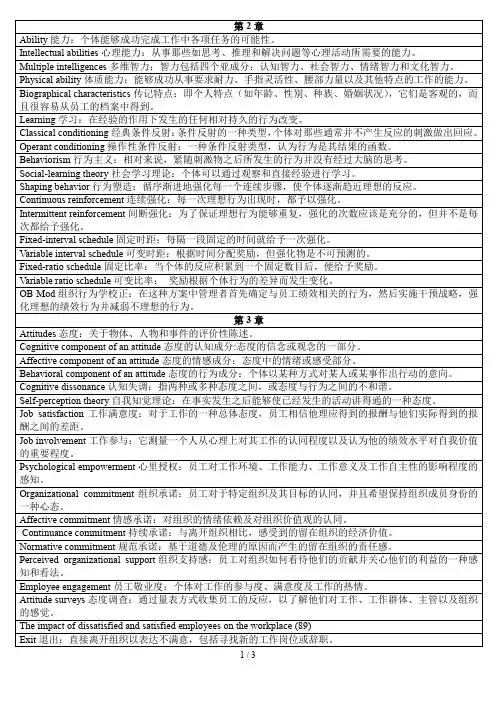
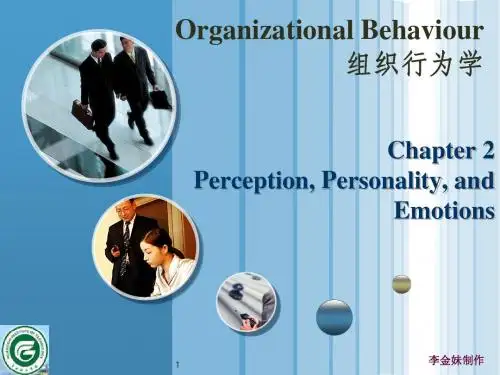

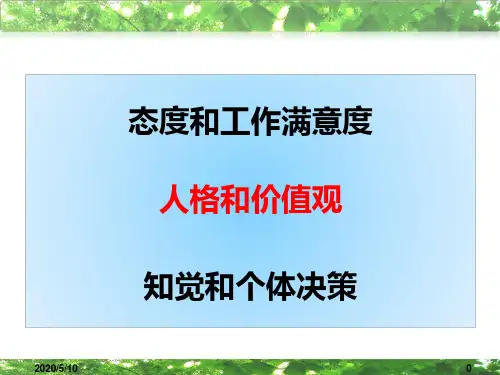

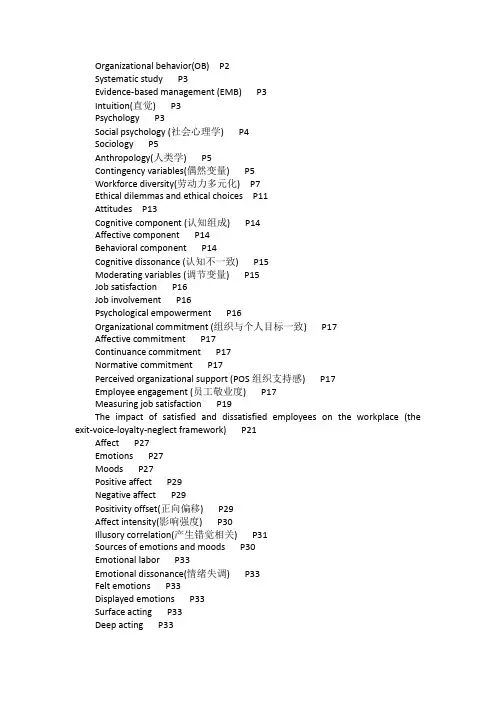
Organizational behavior(OB) P2Systematic study P3Evidence-based management (EMB) P3Intuition(直觉) P3Psychology P3Social psychology (社会心理学) P4Sociology P5Anthropology(人类学) P5Contingency variables(偶然变量) P5Workforce diversity(劳动力多元化) P7Ethical dilemmas and ethical choices P11Attitudes P13Cognitive component (认知组成) P14Affective component P14Behavioral component P14Cognitive dissonance (认知不一致) P15Moderating variables (调节变量) P15Job satisfaction P16Job involvement P16Psychological empowerment P16Organizational commitment (组织与个人目标一致) P17Affective commitment P17Continuance commitment P17Normative commitment P17Perceived organizational support (POS组织支持感) P17Employee engagement (员工敬业度) P17Measuring job satisfaction P19The impact of satisfied and dissatisfied employees on the workplace (the exit-voice-loyalty-neglect framework) P21Affect P27Emotions P27Moods P27Positive affect P29Negative affect P29Positivity offset(正向偏移) P29Affect intensity(影响强度) P30Illusory correlation(产生错觉相关) P31Sources of emotions and moods P30Emotional labor P33Emotional dissonance(情绪失调) P33Felt emotions P33Displayed emotions P33Surface acting P33Deep acting P33Emotional intelligence(EI) P34OB applications of emotions and moods P35Personality P41Heredity(遗传) P42Personality traits P43Myers-Briggs type indicator (MBIT) [extraverted vs introverted ; sensing vs intuitive; thinking vs feeling ; judging vs perceiving] P43Big five model[extra-version外向; agreeableness亲和; conscientiousness认真负责的; emotional stability ; openness to experience ] P44Core self-evaluations P46Machiavellianism(权术主义) P47Narcissism (自恋型) P47Self-monitoring P48Risk taking P48Type a personality P48Proactive personality(主动性人格) P49Values P50Terminal values P50Instrumental values P50Personality-job fit theory P51Power distance P53Individualism(个人主义) P53Collectivism(集体主义) P53Masculinity(男权主义) P53Femininity(女权主义) P54Uncertainty avoidance P54Long-term orientation P54Short-term orientation P54Perception P57Attribution theory(归因理论) [distinctiveness 独特的; consensus 一致性; consistency 连贯性] P58Fundamental attribution error P59Self-serving bias P60Common shortcuts in judging others P60Selective perception P60Halo effect(光圈影响) P60Contrast effect(对比影响) P60Stereotyping P60Rational decision-making model P62Bounded rationality(有限理性) P62Intuitive decision making P63Common biases and errors in decision making P63Organizational constraints on decision making P66Creativity P67Three-component model of creativity P68Motivation P72Hierarchy of needs[physiological ;safety; social; esteem; self-actualization] P73 Theory X and theory Y P74Two-factor theory P74Hygiene factors(卫生因素) P75McClelland’s theory of needs[need for achievement(nAch); need for power(nPow); need for affiliation(nAFF)] P76Self-determination theory P77Cognitive evaluation theory P77Self-concordance(自我和谐) P78Goal-setting theory P78Management by objectives(MBO) P80Self-efficacy theory(自我效能) P81Pygmalion effect P82Equity theory P84Distributive justice(个体判断) P84organized justice P84Procedural justice(程序判断) P85Interactional justice(相互作用判断) P86Expectancy theory[relationship: effort - performance; performance - reward; rewards - personal goals] P86Job characteristics model(JCM) P90Job design P90Job rotation(岗位轮换) P92Job enrichment(工作丰富化) P93Flextime(弹性工作时间制) P94Job sharing P96Telecommuting P96Participative management(参与管理) P98Representative participation P98How to pay: rewarding individual employees through variable-pay programs P100Variable-pay program P100Flexible benefits P103Group P106Formal group P106Informal group P106Command group P107Task group P107Interest group P107Friendship groups P107Five- stage group-development model[forming; storming stage; norming stage; performing adjourning stage] P108Group property P109Role perception P109Role expectations P109Norms P110Reference group P111Deviant workplace behavior(不正常的工作场所行为) P112 Status P113Social loafing(社会性懈怠) P115Cohesiveness P115Group decision making P116Group-think P117Group-shift P117Brainstorming P119Nominal group technique P119Work group P123Work team P123Problem-solving team P124Self-managed work teams P124Cross-functional teams P124Virtual teams P125What factors determine whether teams are successful? P126 Multi-team systems P127Organizational demography(组织的人口统计学) P129 Team processes P130Communication process P135Formal channels P136Informal channels P136Direction of communication P136Interpersonal communication(人与人之间的交际) P137 Formal small-group networks P140Grapevine (秘密信息来源) P140Electronic communications P142Barriers to effective communication P145Filtering P145Communication apprehension P147High-context cultures P148Low-context cultures P148Leadership P150Trait theories of leadership P151Behavioral theories of leadership P152Initiating structure P152Consideration P152Employee-oriented leader P153Fiedler contingency model P154Least preferred co-worker (LPC)[leader-member relations; task structure; position power] P154Leader-member exchange(LMX) theory P156Charismatic leadership theory P157Transactional leaders (相互作用的领导关系) P160Full range of leadership model P161Authentic leaders P163Socialized charismatic leadership P164Trust P164What are the consequence of trust? P165Attribution theory of leadership P165Substitutes for P166Neutralizers P166Identification-based trust P167Chapter1 Introduction to Organizational BehaviorChapter2 Job AttitudesChapter3 Moods, Emotions, and Organizational BehaviorChapter4 Personality Traits and Work ValuesChapter5 Individual Perception and Decision-MakingChapter6 Motivation 1: Basic ConceptsChapter7 Motivation 2: Applied ConceptsChapter8 GroupsChapter9 TeamsChapter10 Communication ProcessChapter11 Leadership。
Organization BehaviorChapter1anizational behavior (OB):A field of study that investigates the impact that individuals, groups and structure have on behavior within organization, for the purpose of applying such knowledge toward improving an organization’s effectiveness2. Managers doManagement functionPlanningA process that includes defining goals,establishing strategy(策略), anddeveloping plans to coordinate〔调整〕activitiesControllingMonitoring activities to ensure they arebeing accomplished as planned andcorrecting any significant deviations〔背离〕.OrganizingDetermining what tasks are to be done, whois to do them, how the tasks are to begrouped, who reports to whom, and wheredecisions are to be made.LeadingA function that includes motivatingemployees, directing others, selecting themost effective communication channels, andresolving conflictsManagement role: 1) interpersonal(人际角色)Figurehead(头面人物) Leader(领导者) Liaison(联络人)2) informational(信息传递者)Monitor(监控者) Disseminator(传递者) Spokesperson(发言人)3) Decisional(决策角色)Entrepreneur(创业者) Disturbance handler(混乱处理者)Resource allocator(资源分配者) Negotiator(谈判者) Management skills: 1) Technical skillsThe ability to apply specialized knowledge or expertise〔专门技术〕.2) Human skillsThe ability to work with, understand, and motivate other people, both individually and in groups.3) Conceptual skillsThe mental ability to analyze and diagnose(诊断) complex situations.3. Effective versus Successful Managerial Activities1) Traditional managementDecision making, planning, and controlling2) CommunicationExchanging routine(例行的) information and processing paperwork3) Human resource managementMotivating, disciplining, managing conflict, staffing(人员指挥), and training 4) NetworkingSocializing, politicking(政治活动), and interacting(相互影响) with others4. Challenges and Opportunities for OB1) Responding to GlobalizationIncreased foreign assignmentsWorking with people from different culturesOverseeing movement of jobs to countries with low-cost labor2) Managing Workforce Diversity(差异,多样性)Embracing diversityChanging demographics〔人口〕Implications for managersRecognizing and responding to differences3) Improving Quality and ProductivityQuality management (QM)Process reengineering4) Responding to the Labor ShortageChanging work force demographicsFewer skilled laborersEarly retirements and older workers5) Improving Customer ServiceIncreased expectation of service qualityCustomer-responsive cultures6) Improving People Skills7) Empowering(授权) People8) Stimulating(刺激) Innovation(改革) and Change9) Coping with “Temporariness(临时性)〞10) Working in Networked Organizations11) Helping Employees Balance Work/Life Conflicts12) Improving Ethical(伦理的) Behavior5. Independent and dependent variables2) Independent variable1) individual-level variables个体水平变量人们带着不同的特点进入组织,这些特点将影响到他们在工作中的行为。
组织⾏为学Personality⼈格Our Inquiry about Personality1.Introduction: Our personality shapes our behavior. This can help us knowsomeone around us better and associate with others swimmingly. So our group has great interest to explore personality theory and practice. We lay stress on personality traits. We will quote theoretical model such as the Big Five Model, Type A Personality and so on. At the same time, we would cite some examples from the movie The Devil Wears Prada and our real word. What we want to show is that how personality influences us and how to make full use of it.2.Theory and cases:①First of all, we should know that personality is the sum total of waysin which an individual reacts to and interacts with others. And it is aresult of both hereditary and environment factors. The example ofwolf children proves this. A little baby was abandoned by his parents,and then adopted by a pack of wolves. Several years later, he was bredto be a child and behaved like a wolf. If at this time humans came toteach him to talk and walk, he would also master human language after a period of time.②Dress is an important part of your personality. To bring the style whichenhances your appearance is the greatest secret of personality building.In the movie The Devil Wears Prada, the leading lady Andy deeply realized that the importance of dressing. At first, almost everyone made fun of her because of her bad dressing. But when she began to dress up well, both colleagues and superiors looked at her with new eyes. Dressing according to the occasion is a great help to give strong impetus to your personality. Walking in the morning exercise and nutritious diet are healthy activities that lead to good personality. But for this you need to find perfect dress that should give you the best look. But the most important aspect that essentially provides quantities is a dress up suitable suits your personality. Especially women are at the top in this line and find themselves made various efforts to do so.This is not only in fashionable circle. It happens everywhere! Dress is the mirror of your side and shows what you in real time. So we can?t neglect this.③What is the role of personality in a marriage or a love scene? Whatdifference does the personality of partners make to a happy marriage?In the movie The Devil Wears Prada, Andy…s boyfriend left her because she was a workaholic. And Miranda also lost her family anddivorced again and again just for her job. Small differences are always ignored because of the love between the couple, but if the difference in personalities is big, love will also get sacrificed. Let us take another example. The wife is of giving typeand the husband is a real stingy person. What then? Half of the time they will have arguments about this. According to the personality traits, we can see how important the consistency in personality is between couples.④The Big Five Model provides a unifying personality frameworkincluding extraversion, agreeableness, conscientiousness, emotional stability, openness to experience. First, extraverts tend to be happier in their jobs and in their lives as a whole. For instance, Andy was outgoing and sociable and she had more friends and spend more time in social situations. Second, people who score high on emotional stability are happier than those who score low. Emotional stability is most strongly related to life satisfaction. For example, in the movie, Andy asked help for a designer called Nigel to improve her figure after the editor in chief—Miranda criticized her strictly. She didn?t hold back in face of difficulties, oppositely she chose to brave them.From this we can see Andy?s ability to withstand stress is good. This kind of people can calmly deal with most trouble in daily life. Finally, individuals who are open are more creative in art. They also cope better with organizational change and are more adaptable in changingcontexts. Just like Miranda in the film, she altered personnel transfer rapidly and swiftly when she knew the boss of the magazine was about to dismiss her.⑤Authoritarian character and Machiavellianism.Here is an example.Once president of Kuomintang, Chiang Kai-shek, at first a pacifist, finally his ambition to seek personal dictatorship is soaring. So he launched the civil war. Originally, he can become a popular leader just as Mao Zedong but his autocratic character led him to an evil way. So this is the negative effect of autocratic personality. Of course, autocratic people have some forte: decisive, powerful, and unyielding.Just like Miranda. In the Runway periodical office, her words stood for everything. I think that autocratic people are fit for Machiavellianism because they win more, are persuaded less, and persuade others to do as they think. For example, Machiavellianism can be put to some examination in King Lear, arguably Shakespeare's central tragedy, which examines the sources of political and moral authority in a pre-Christian world. Another case: Hillary Clinton has gone out of her way to emphasize her support for faith-based social services. In January 2005 she told a group of pastors in Boston that people who see “God's work in the lives of even the most hopeless and left behind” are most likely to “go out onto the street to save some poor, at-risk child.”There is an element of Machiavellianism about this:Democrats currently have a better chance of winning over disillusioned evangelicals than for many years. But there is an element of common sense too. Americans are increasingly worried about poverty, but are skeptical about government bureaucracies.Faith-based institutions appear to offer a solution to the conundrum.⑥Workaholics and Type A personality.Just as we mentioned before,Andy is a workaholic. She once put all her energy into her work---an assistant of an editor. Even on a dinner with her father, she can?t afford enough time to talk with him. She totally did as Miranda said. She couldn?t reach his boyfriend?s birthday party on time, to speak accurately, she was too late. We can see that she loves her boyfriend but she is not good in focusing their attention on the right things. The characteristic of workaholics are: First, preoccupied with work, even at home or attend social activities; Second, reluctant to empower to others, because they need a sense of control; Third, ignoring the other side of the life, because the workaholic is always putting work in front of family. If they work for their livelihoods, this crazy working condition is understandable, such as Andy; If they just meet the demand for a sense of achievement by working on and on, they will not only let the spouse disappointed, but also may increase unfamiliar feeling with the children, the most serious can lead to both sides ofhusband and wife, u ntil divorce, such as Miranda. So we can?t be too crazy about work. We should not forget to enjoy life!A person with a Type A personality has features of workaholics:incessant struggle to achieve more and more in less and less time, can?t cope with leisure time. They are usually fast workers emphasizing quantity over quality. Type A?s are also rarely creative.They will not allocate the time necessary to develop unique solutions to new problems. But they may do better in job interviews. So they can be a good employee but not a qualified manager. This is why most employees in workplace can?t get promotion every year.⑦Measuring personality is not easy. Though some personality tests areuseful in hiring decisions, you will never know which employee would be corrupt and negligent about his or her duties. Andeven you don?t know when he will job-hop! In a word, you can easily choose the talents you want, but it is hard to avoid bad behaviors for someone.So we need a preeminent organizational culture to develop employees? healthy and sane personality.3. SummaryOur paper is brief. While we believe that you will be interested in some ideas we offer. We consider Personality as the most importantfactor to make success; others are chances, environment and so on. If you have a powerful inner, nothing will be unconquerable!。